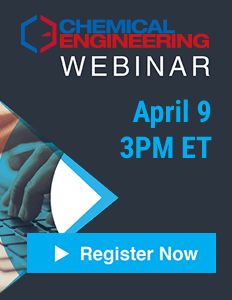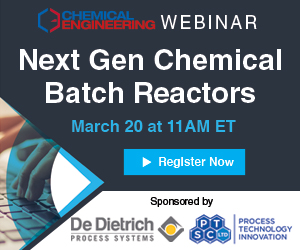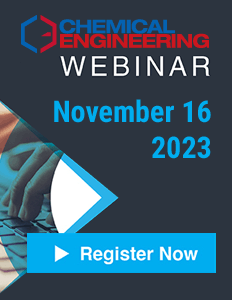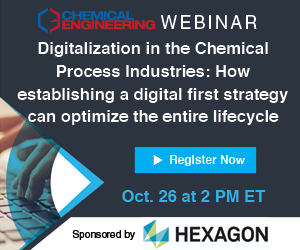Webinars
Webinar with ADM: Improve PLS models with Process Efficiency
FREE | May 21, 2024
REGISTERAre you struggling to extract meaningful insights from your industrial data using traditional PLS (Partial Least Squares) modeling techniques? It’s a common challenge—despite scrutinizing scores, loadings and statistical parameters, achieving satisfactory model performance remains elusive. In this webinar, Marc Champagne from ADM shares insights on how the company was able to implement a new PLS model methodology and: Join us and see firsthand how PLS models can improve performance and empower your team with actionable insights. Register now to secure your spot!

Beyond Boundaries: A Deep Dive into Remote Monitoring Strategies and Data Intelligence Impact
FREE | April 9, 2024
REGISTERJoin us for an insightful webinar as industry experts delve into the realm of remote monitoring and data intelligence, unraveling the technologies and methodologies that are reshaping the landscape of decision-making. Our esteemed panelists will provide a quick introduction, defining the significance of data intelligence and remote monitoring, setting the stage for an in-depth exploration.
Discover the essential elements needed before incorporating remote monitoring into your portfolio, and gain valuable insights from our panelists as they share examples of how they utilize data monitoring and remote monitoring, managing the collected data efficiently. Learn how these technologies seamlessly integrate with project management software and play a pivotal role in the renewable energy sector, addressing industry gaps and fostering innovation.
The discussion will not shy away from challenges, particularly focusing on cybersecurity and data collection hurdles. Our panelists will share their experiences on the impact and relevance of decision-making with information gathered through remote monitoring. Explore whether remote monitoring meets the needs or if there’s room for expansion, and how it aids in filling staffing knowledge gaps within organizations.
Dive deep into the regulatory landscape as our experts discuss if remote monitoring is being employed to meet compliance issues. Gain valuable insights into the strategies employed by organizations to ensure they stay ahead of the curve in an ever-evolving technological landscape.
Don’t miss this opportunity to gather knowledge from seasoned professionals who are at the forefront of leveraging remote monitoring and data intelligence to make informed decisions, drive innovation, and stay ahead in today’s competitive industries. Join us for a thought-provoking discussion that will reshape the way you perceive and harness the power of data.
This webinar is proudly sponsored by Emerson Automation Solutions.

Next Gen Chemical Batch Reactors
FREE | March 20, 2024
REGISTERUnlike most progressive industries, the chemical industry has relied on simple batch reactors and as such has not developed anything resembling lean production processes or competitive advantage. The technology currently being used to determine the primary production scale and output for most synthesis chemistry is still that of the mid-20th century. This lack of technological innovation ultimately determines throughput, quality and energy consumption, regardless of geographic manufacturing region.
Over the last 25+ years there has been significant time and energy expended on evaluating a more radical flow chemistry which promises much but comes with as many difficulties as it solves. These include inflexibility, new plant requirements, alternative process procedures and massive investments, to name a few.
There is, however, a more rational approach used by nearly every other manufacturing segment and that is to make the existing production process more productive, while retaining the basic infrastructure and process flow.
This webinar aims to show how changes in reactor system technology for current plant designs not only provides huge beneficial effects in overall chemistry batch production and quality but enables further down-stream beneficial thinking.

Leveraging Digital Process Twins for Efficient and Flexible Hydrogen Production: From Design to Operation
FREE | January 31, 2024
REGISTERHydrogen has become a vital clean energy source amid global efforts to decarbonize industries and enhance energy security. However, the dynamic nature of renewable energy sources like solar and wind, often used in hydrogen production, presents significant challenges. To address these challenges, it is imperative to design hydrogen production facilities for flexibility rather than around a single operating point. Additionally, once operational, maximizing cost-efficiency hinges on factors such as renewable energy availability, grid pricing, and hydrogen demands.
Digital process twins, driven by high-fidelity process models, prove indispensable throughout this journey. During the design phase, these digital twins empower engineers to explore the design space, assess risks, and make informed decisions. In the operational phase, they serve as the foundation for a hydrogen energy management system. This system empowers operators to monitor the state of their hydrogen production assets, accurately model production efficiency, and leverage forecasts for renewable energy availability, grid pricing, and hydrogen demands to determine the optimal production schedule.
In this webinar, we will highlight the significant benefits of adopting a consistent modeling approach throughout all project phases. This approach facilitates seamless knowledge transfer among project teams and ensures that deep process understanding gained during design can be seamlessly deployed to operations for real-time monitoring and optimization. By doing so, it not only streamlines project development but also contributes to the industry’s pursuit of efficient, flexible, and sustainable hydrogen production.

So you’ve started to digitalize your calibration program…now what?
FREE | December 13, 2023
REGISTERJoin us as we navigate the crucial steps to leverage digitalization effectively, starting with optimizing due dates for calibrations and aligning them with available resources. Learn to streamline your processes by tracking standards like multi-function calibrators, weights, and more for enhanced efficiency. Embrace courage as we guide you through evaluating and trimming redundancies in your calibration process. Discover the data-driven approach to calibrating intervals based on historical trends, ensuring precision without the risks of under or over-calibration. Join us for valuable insights and strategies under the theme “So you’ve started digitalizing your calibration program… now what?”

Webinar with Dow: Unleash the Power of Hybrid Modeling for Process Design and Optimization
FREE | December 7, 2023
REGISTERFor decades, first principle models have been used for process design and optimization in the chemical industry. Recent innovations employ machine learning techniques—enriched with first principle constraints—to create a hybrid model that closely represents real plant behavior. Fast, easy access to industrial AI is helping organizations make accurate decisions to select an optimum design quickly and improve operations, maximizing productivity and minimizing energy usage.
During this webinar, AspenTech experts will be joined by Reza Haghpanah of Dow to discuss how the company leveraged Aspen Hybrid Models™ to:
- Develop a data-driven model of a highly integrated process
- Achieve a more accurate and comprehensive representation of the process, creating optimization opportunities
- Increase productivity of the process by 10-15% with optimum operating conditions
Learn how you can transform your operations with hybrid modeling.
There will be a Q&A session following the event. We encourage you to join the conversation by submitting questions when registering.
By registering for this webinar, your contact information may be shared with our co-sponsor, Access Intelligence, LLC. Please click here to view data privacy policies.

Innovative Solutions for Sustainable Power: Navigating Regulations and Enhancing Efficiency
FREE | November 16, 2023
REGISTERJoin us for a thought-provoking webinar that delves into the dynamic world of the power industry, where technology and innovation intersect with sustainability and regulatory compliance. In “Innovative Solutions for Sustainable Power,” we will explore cutting-edge strategies for modernizing legacy systems, embracing automation and AI, and ensuring that digital projects drive business value while meeting regulatory requirements.
Our expert panel of industry leaders will discuss the latest advancements in power generation, emphasizing the critical role of technology in reducing emissions and optimizing energy production. Discover how power companies can navigate complex regulatory landscapes, address environmental concerns, and create a more sustainable future for generations to come.
Key topics include:
• Leveraging technology for sustainable power generation
• Modernizing legacy systems for greater efficiency
• Harnessing the potential of automation and AI in the power industry
• Strategies for regulatory compliance and stakeholder engagement
• Successful execution of digital projects that drive business value
Don’t miss this opportunity to gain insights into the power sector’s future, where innovation, sustainability, and regulatory compliance converge to shape the industry’s landscape. Join us and be part of the transformation toward a greener, more efficient power generation future.

Beyond ProcessBook & PI Vision: Exploring Today’s Industrial Analytics Tools
FREE | November 28, 2023
REGISTERIn the Manufacturing 4.0 era, industrial organizations have more data at their fingertips than ever, offering the promise of higher production rates, more consistent quality, and reduced costs through data-driven strategies.
Standing between many businesses and this promise of process optimization are questions surrounding the right tools to harness this data effectively – a choice complicated by the shifting status of longtime standard OSIsoft’s ProcessBook and PI Vision applications.

Digitalization in the Chemical Process Industries: How establishing a digital first strategy can optimize the entire lifecycle
FREE | October 26, 2023
REGISTERThe chemical process industries (CPI) are a diverse set of manufacturing sectors, each with its own set of concerns and requirements. However, a common thread among the sectors is an effort to leverage digital tools to improve the safety, profitability and sustainability of the entire asset lifecycle. Because the fields related to digitalization — such as artificial intelligence, industrial internet of things (IIoT), cloud computing, cybersecurity and others – are evolving quickly, it can be difficult to get a handle on the current state of affairs within the industry, as well as to discern where the digitalization journey will take the industry in the future.
This question-and-answer panel discussion will bring together experts who engage with digitalization in the CPI as a major part of their duties, and who have thought about how the deployment of new digitalization technologies will affect every aspect of industry, including how it fits into a world increasingly focused on environmental, social and governance (ESG) sustainability.
The speakers will share their experiences working with CPI companies on digitalization projects, recent research and analysis carried out to find information in this area, and how the CPI can learn from not only its own history, but also from the experiences of other heavy industries. Please join us for an engaging discussion, and bring your own questions for the speakers to address in the live Q&A session.

Securing Hydrogen Infrastructure: Using Safety as a Model for Cybersecurity
FREE | November 8, 2023
REGISTERThe burgeoning hydrogen economy holds immense potential in the fight against the global climate crisis. Its rapid expansion necessitates vigilance in safeguarding our critical infrastructure. This webinar draws inspiration from the evolution of human safety programs, which transformed from isolated initiatives into integrated programs driving safety-centric corporate cultures. In parallel, we seek a new era in cybersecurity—one marked by cohesion, comprehensiveness, and commitment to continuous improvement.
Delving deeper, we illuminate the parallel evolutionary paths of human safety and cybersecurity, emphasizing the need for dedication to bolstering cyber resilience. Our webinar advocates for shifting from passive regulatory compliance to a proactive ethos, with individual accountability and responsibility emerging as the driving forces fortifying our cybersecurity defenses. Attendees will learn valuable insights and pragmatic strategies shared by our industrial cybersecurity expert. This experience empowers you to cultivate a cybersecurity culture echoing the successes of current safety programs, fostering cross-functional collaboration, charting a persistent course for continuous cybersecurity improvement, and navigating the regulatory landscape with confidence.
Together, we can embark on this transformative journey towards a secure hydrogen future. Here, the enduring lessons of human safety programs serve as guiding principles illuminating the path to cybersecurity maturity. Our collective efforts will ensure that the hydrogen industry not only flourishes but securely thrives in an era defined by digital interconnectivity and rapid growth.
